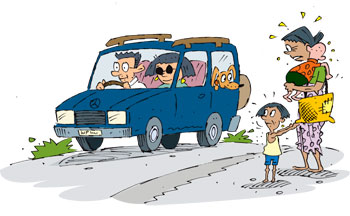Equity - a must for world peace

Small is beautiful they say, yet could be devastating when overlooked
and neglected. It is the total disregard for what is small that
contributes in no small measure to a dysfunctional whole be it familial
social, national or even international levels. Hence, the need for a
levelled playing field in all sectors of socio/econ/political into
equity - a pre-cursor for human dignity and social justice - now very
much the concern area if we are to achieve social development goals.
The neglect of ethno/religious/political minorities, the disregard
for the outcaste, the insignificance of the economically disadvantaged
the small farmer and industrialist, the oppressed women and children -
these are among what is termed 'small' who when allowed to remain
ignored over a continued period of time could be ideal springboard for
all that goes with volatility.
The move towards individual rights recognition is therefore strongly
recommended - going beyond what was earlier group rights.
 Loan disbursement only to large scale high brow corporate
conglomerates into building financial empires for even generations
unborn while in their quest for making big time monies throw away a
pittance to those that slot to make them what they are - the stinking
rich. In terms of social equity and development, what has all this
status quo to offer? The poor get poorer, the rich, richer. Compelled by
circumstances beyond their control, small time farmers, even mortgage
future harvests while small industrialists close shop, unable to compete
with foreign goods. When from pin to piano is imported and a wet blanket
is what a local industrialist gets when initiating some small industry,
equity becomes unthinkable. Loan disbursement only to large scale high brow corporate
conglomerates into building financial empires for even generations
unborn while in their quest for making big time monies throw away a
pittance to those that slot to make them what they are - the stinking
rich. In terms of social equity and development, what has all this
status quo to offer? The poor get poorer, the rich, richer. Compelled by
circumstances beyond their control, small time farmers, even mortgage
future harvests while small industrialists close shop, unable to compete
with foreign goods. When from pin to piano is imported and a wet blanket
is what a local industrialist gets when initiating some small industry,
equity becomes unthinkable.
Economic liberalisation
The avenues opened up following economic liberalisation and free
education has enabled those with resources towards upward social
mobility who in turn are now transforming into being elites within the
elites - the new rich as they are called. Yet this growth in terms of
equity is negligible.
However, in neighbouring India, Nepal, Maldives and Bhutan, one finds
the slow pace of economic liberalization warranting an equally slow
social transformation process. Therefore, despite chances of upward
social mobility, Sri Lanka and these countries share commonality of
heightened social inequity. Hence, the deduction of development and
social inequity being two distinct and highly polarized states.
Wealth in the hands of a few that neglect the deprived larger social
whole cannot be condoned until and unless those affluent few are heavily
into sustaining the other as is the case in Scandinavia's social
democracies. The rich in these countries welcome taxation as they too
stand to gain in social security.
The concept of equity finds no parallel and is operation worthy in
socio/econ/political fields to maintain systemic equilibrium. Some
avenues into equity are power sharing through devolution, taxing the
rich to facilitate the poor, strict enforcement of laws to prevent
exploitation of women and children, small time industrialists and
farmers' access to micro credit that warrant national policy formulation
and implementation for the realisation of equity and thereby the
prevention of social upheavals.
Violent societies record high degree social inequity unlike for
instance social democracies that make up the Scandinavian countries. In
the absence of the rule of law, inequity and inequality are only to be
expected. Deprived economic majorities, disgruntled political, ethnic,
religious and caste minorities, crime and violence are necessary follow
up in the absence of the rule of law.
Physical growth alone is non-reflective of the quality of life.
Economic liberalisation and democratization alone will not result in
equity. Unless checked every step of the way, what follows as a result
would be highly polarized states of physical growth and deprivation
resulting in inequity followed by crime.
Certainly we live in a utopian state believing crime to be eliminated
only by the state repressive mechanisms. These institutions of control
often protect the rich and powerful. Despite all resources at one's
disposal, white collar crime persists - bribery, corruption and what
not, leaving one to understand how despicable the situation could be in
times of poverty.
For instance, the poor man out there on the pavement stands with his
wife and child, dressed in rags not knowing what his dinner would be.
He watches the temple priest drive away in a chauffer driven
limousine. Come night, the guy robs the temple till. Yet the law turns a
blind eye on inequity - the root cause of crime. Instead, the poor man
is put behind bars. That's as far as economic marginalisation goes.
Violence
In the realms of religio/ethno political marginalisation - the
inequity arising thereof precedes crime and violence. Discrimininatory
legislation and attitudes lead these minority groups into terror
tactics.
Yet, these groups are seen as terrorists, insurgents, criminals
insane persons and what not while overlooking the causes for such
dastardly acts. Delving indepth one finds the absence of equity to be
the prime factor.Against this backdrop, one could even question the role
played by world bodies such as the UN, IMF, World Bank and so on in
working towards equity. Human dignity, and social justice to these
organisations remain only at conceptual level. It is time these
institutions meant for mankind's well-being embarked on a practical and
pragmatic work programme in making world peace a reality by endeavouring
towards equity. |
